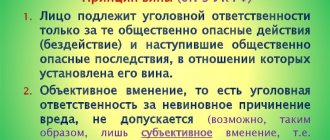Grounds for criminal prosecution
The grounds for criminal prosecution are reflected in the Criminal Code of the Russian Federation. The reason can only be the commission of an act that has elements of a crime under a specific criminal article. When talking about the basis for bringing a person to criminal liability, it is necessary to define the crime. It is understood as a socially dangerous act prohibited by the Criminal Code of the Russian Federation under threat of punishment. If an action is not dangerous to society, it is not considered a crime.
We list the conditions for bringing to criminal liability:
- the age of criminal responsibility;
- sanity and capacity;
- presence of signs of a crime.
The composition of an illegal act is understood as its subject, object, objective and subjective sides. Let's look at them using the example of murder. Criminal liability is possible if the offender violated a person’s right to life (this is the object), reached 14 years of age (then he is considered the subject of the crime), deprived a person of life in an unlawful way (objective side), guided by direct intent (subjective side). If an act meets all the criteria, it is classified as a certain type and, depending on this, a punishment is assigned. It depends on aggravating and mitigating circumstances, the number of victims, and the method of murder.
TYPE AND SIZE OF PUNISHMENT
The Plenum formulated a general legal standard for determining the type and amount of punishment for crimes provided for in Art. 159–159.3, 159.5, 159.6, 160, 165 of the Criminal Code of the Russian Federation, if these crimes were committed in the field of business activity, as well as Art. Art. 170.2, 171–174, 174.1, 176–178, 180–183, 185–185.4, part 1 art. 185.6, art. art. 190–199.2 of the Criminal Code of the Russian Federation. As the Plenum explained, courts need to be guided by the general principles of sentencing and discuss the possibility of applying the provisions:
- on punishment below the lowest (parts 1 and 2 of Article 64 of the Criminal Code of the Russian Federation);
— suspended sentence (Article 73 of the Criminal Code of the Russian Federation);
— changing the category of crime (Part 6 of Article 15 of the Criminal Code of the Russian Federation);
— release from punishment due to a change in the situation (Article 80.1 of the Criminal Code of the Russian Federation).
Keeping a convicted person in custody until sentencing cannot predetermine the imposition of a sentence in the form of actual imprisonment. Moreover, by virtue of the provisions of Part 5 of Art. 72 of the Criminal Code of the Russian Federation, assigning such a person a fine, deprivation of the right to hold certain positions or engage in certain activities as the main type of punishment, the court, taking into account the period of detention, mitigates the imposed punishment or completely releases the convicted person from serving this sentence (clause 19 of Resolution No. 48 ).
Age of criminal responsibility
Bringing minors to criminal liability (they are considered persons under 14 years of age) is impossible. In general, sanctions are imposed from the age of 16. However, for serious crimes, the minimum age of criminal responsibility is reduced to 14 years. These include:
- murder;
- causing grievous harm and moderate harm with intent;
- kidnapping;
- rape;
- sexual assault;
- theft, robbery and robbery;
- extortion;
- terrorist attack;
- hostage taking;
- participation in mass riots.
In addition, from the age of 14, they are punished for aggravated hooliganism, vandalism, theft of weapons, production of explosives, etc.
Note!
The maximum age for criminal prosecution is not defined in the Criminal Code of the Russian Federation. But the courts are based on the defendant’s state of health. In case of serious illness, they may be released from punishment.
DIFFERENCES IN THE SUBJECT OF PROOF
The concept of “entrepreneurial activity” is of key importance for determining the special - public-private legal regime of criminal proceedings.
The concept of crime in the field of business activity.
Unconditionally committed in the field of entrepreneurial activity include crimes provided for in parts 5–7 of Art. 159 of the Criminal Code of the Russian Federation. Based on paragraph 4 of the notes to Art. 159 of the Criminal Code, crimes provided for in parts 5–7 of Art. 159 of the Criminal Code of the Russian Federation, are always committed by the above-mentioned persons only in the field of entrepreneurial activity.
Meanwhile, the Plenum of the RF Armed Forces classified as “entrepreneurial” crimes against property the crimes provided for in parts 1–4 of Art. 159 of the Criminal Code of the Russian Federation, thereby developing the criminal legal aspect of the concept of “entrepreneurial activity” (clause 7 of Resolution No. 48). Thus, any of these crimes may be included in the material and legal composition of the subinstitution we are analyzing. This point of view is supported by the wording of paragraphs. 1–3, 7, 9 of Resolution No. 48, which provides a list of crimes in the following form: “Articles 159–159.3, 159.5, 159.6, 160 and 165 of the Criminal Code of the Russian Federation.” To understand the position of the Plenum, it is important to take into account that in the final version of Resolution No. 48 the original wording that existed in it was not consolidated: “To qualify the actions of the perpetrator under parts 5–7 of Article 159 of the Criminal Code of the Russian Federation, it does not matter at what moment the intent to commit fraud arose , before or after the conclusion of the relevant agreement." It further followed that “fraudulent actions associated with deliberate failure to fulfill contractual obligations, when the parties are entrepreneurs and (or) commercial organizations, under no circumstances can be qualified under parts 1–4 of Article 159 of the Criminal Code of the Russian Federation.”
This means that the crimes provided for in Art. 159, 159.1–159.3, 159.5, 159.6, 160 and 165 of the Criminal Code of the Russian Federation are subject to the analyzed legal institution if they are committed in the field of entrepreneurial activity and the subject of the crime has the status of an entrepreneur.
Therefore, the subject of proof includes establishing the special “entrepreneurial” status of the accused. These could be:
- the head of a commercial organization, if he has committed a crime that is connected either (1) with the exercise of his powers to manage a commercial organization or (2) when a commercial organization carries out entrepreneurial activities;
- a member of the management body of a commercial organization, if he has committed a crime that is connected either (1) with the exercise of his powers to manage a commercial organization, or (2) when a commercial organization carries out entrepreneurial activities (clause 7 of Resolution No. 48);
- a person working under an employment contract in a commercial organization engaged in entrepreneurial activities (for example, a manager, accountant, sales agent, etc.), or with an individual entrepreneur who has committed a crime in complicity with the individual entrepreneur or the head of a commercial organization - under the above conditions (Clause 8 of Resolution No. 48).
Intention to fail to fulfill a contract.
The prosecution must prove such a mandatory sign of fraud, provided for in Part 5 of Art. 159 of the Criminal Code of the Russian Federation, as a deliberate failure to fulfill contractual obligations in the field of entrepreneurial activity. Evidence is needed of a party's intentional failure to fulfill the contract in full or in part of the obligation assumed in order to steal someone else's property or acquire the right to someone else's property by deception or abuse of trust of the other party to the contract (clause 9 of Resolution No. 48).
Since this feature may be the subject of judicial review in the manner provided for in Art. 125 of the Code of Criminal Procedure of the Russian Federation, which means it must be qualified according to the standard of evidence, called “reasonable assumption.” In other words, the investigation needs a body of evidence sufficient to initiate criminal prosecution, at the same time allowing for a further revision of the position of the law enforcement officer when new circumstances are identified8.
The question of the need to prove contractual, civil relations between the victim and the suspect at the time of filing an application to initiate a criminal case remains debatable. In the dispute about the evidentiary significance of this circumstance, one can support P. S. Yani, who believes that the entrepreneurial nature of the crime is not excluded even when the subject of fraudulent seizure is the funds of state target programs, the allocation of which is related to entrepreneurial activity. Moreover, the entrepreneurial nature of a crime against property does not depend on the existence of contractual relations covering a criminal encroachment on property, nor on the fraudulent method of such an encroachment, nor on the emergence of intent to steal even before the perpetrator receives property under the contract9.
Victim status.
The prosecution must also establish that the victim-applicant is an individual entrepreneur or representative of a commercial organization. As the Plenum explained, criminal cases of crimes under Art. 159–159.3, 159.5, 159.6, 160, 165 of the Criminal Code of the Russian Federation, are initiated upon application:
- a person who, in accordance with the organization’s charter, is its sole manager (a person performing the functions of the sole executive body) or the head of a collegial executive body (for example, the chairman of the board of a joint-stock company), or
- a person authorized by the head of a commercial organization to represent its interests in criminal proceedings in accordance with Part 9 of Art. 42 of the Code of Criminal Procedure of the Russian Federation.
If the head of a commercial organization is suspected of committing these crimes, a criminal case can be initiated upon the application of:
— the management body of the organization, the competence of which, in accordance with the charter, includes the election, appointment of a manager and (or) termination of his powers (for example, the board of directors), or
- a person authorized by this body to make such an application.
If a report of a crime came from other persons, then it cannot serve as a reason to initiate a criminal case. The investigator who decides to initiate a criminal case must establish the characteristics of an authorized applicant through relevant documents. Otherwise, the criminal case is subject to termination under paragraph 5. 1 tbsp. 24 of the Code of Criminal Procedure of the Russian Federation: absence of a statement from the victim, if a criminal case can be initiated only at his request, with the exception of cases provided for in Part 4 of Art. 20 Code of Criminal Procedure of the Russian Federation.
Procedure for criminal prosecution
The procedure for criminal prosecution involves several stages. First, a criminal case is initiated against the suspect. The investigator or body of inquiry establishes the guilt of the person and the admissibility of imposing a sanction. They make a decision on the person’s new status - the suspect becomes the accused. When the investigation is completed, all case materials are sent to the court. After this, the trial begins. Bringing a debtor or other person to criminal liability is possible only by decision of a judge.
The procedure for bringing judges to criminal liability
The procedure for holding a judge criminally liable differs from the generally accepted one due to the special status of this person. For example, certain investigative and procedural actions can be carried out against him only with the prior consent of the judicial authority. Only higher authorities can carry out these actions. Only the Prosecutor General or the person performing his duties has the right to initiate a case against a judge, if the panel of judges has agreed to this. Detention of a judge is also permitted only with the approval of the Prosecutor General.
Note!
It is prohibited to detain judges for administrative offenses.
We should not forget about the immunity of a judge. This concept also includes a prohibition on holding an official accountable for his decision in a case.
The procedure for bringing a deputy to criminal liability
A deputy is also considered a person with a special status. In order to subject him to sanctions, it is necessary to deprive the parliamentarian of immunity; this is possible only on the proposal of the prosecutor. Only after the deprivation of immunity is detention, arrest, search or interrogation allowed, except in cases of detention at the scene of a crime.
The procedure for bringing a lawyer to criminal liability
Lawyers are also included in the list of persons for whom a special procedure for criminal prosecution is provided. It was established to protect these individuals from unjustified persecution. The decision to initiate a case can only be made by the head of the investigative body.
The procedure for vesting federal judges with powers
The procedure for vesting judges with powers is determined by Art. 6 of the Law on the status of judges in the Russian Federation:
- Judges of the Supreme Court of the Russian Federation are appointed by the Federation Council on the proposal of the President of the Russian Federation, which is submitted on the basis of a proposal by the Chairman of the Supreme Court of the Russian Federation.
- Judges of arbitration courts of districts and specialized arbitration courts, other federal courts of general jurisdiction and arbitration courts are appointed by the President of the Russian Federation on the proposal of the Chairman of the Supreme Court of the Russian Federation, which is sent to the President of the Russian Federation no later than 30 days from the date of receipt from the chairman of the relevant court of the proposal on the appointment of the recommended person to the position judges.
- Judges of military courts are appointed by the President of the Russian Federation on the recommendation of the Chairman of the Supreme Court of the Russian Federation in the presence of a positive conclusion of the High Qualification Board of Judges of the Russian Federation. The said proposal is sent to the President of the Russian Federation no later than 30 days from the date of receipt of the proposal from the chairman of the relevant court on the appointment of the recommended person to the position of judge.
The President of the Russian Federation, within two months from the date of receipt of the necessary materials, appoints judges of federal courts, and submits candidates for judges of the Supreme Court of the Russian Federation for appointment to the Federation Council of the Federal Assembly of the Russian Federation or rejects the submitted candidates, which is reported to the Chairman of the Supreme Court of the Russian Federation.
Appointment of candidates to the positions of judges is made only if there is a positive conclusion from the relevant qualification board of judges.
A judge may be appointed, upon his application, to a position similar to the one he holds in another court of the same level in the manner established by the Law on the Status of Judges in the Russian Federation. In the same manner, a federal court judge may be appointed to a position similar to his or her position in a lower court.
Illegal prosecution
Law enforcement officers and other officials bear responsibility for illegal prosecution. It is spelled out in Art. 299. Illegal prosecution under the Criminal Code of the Russian Federation is punishable by up to 7 years in prison. If a person is wrongly accused of a serious or especially serious crime with serious consequences, the upper limit of the sentence increases to 10 years. If the attacker had selfish goals in illegally prosecuting an innocent person, he can also receive up to 10 years in prison.
SEIZURE OF OBJECTS AND DOCUMENTS
Common to the analyzed institution are the norms contained in Art. 81.1 of the Code of Criminal Procedure of the Russian Federation, which sets out the requirements for the procedure and timing for recognizing objects and documents as material evidence, as well as their return to the persons from whom they were confiscated. The Plenum of the RF Armed Forces specifically explains the procedure for appealing the decision of the preliminary investigation body to refuse to return the specified items and documents to persons from whom they were confiscated (clause 10 of Resolution No. 48) but were not recognized as material evidence. An interested person can appeal such a refusal both to the head of the investigative body or the prosecutor, and to the court in accordance with Art. 125 Code of Criminal Procedure of the Russian Federation.
Application for criminal prosecution (sample)
An application for criminal prosecution must contain:
- name of the body and full name of the head in whose name the application is written;
- applicant's details and contacts;
- Full name of the offender;
- circumstances of the case;
- links to articles of laws;
- an indication that the applicant has been warned of liability for false denunciation;
- date and signature.
A sample application for criminal prosecution can be obtained from the police department, court and prosecutor's office.
What are the statute of limitations for criminal prosecution?
The statute of limitations is the period during which criminal prosecution for a crime is possible. It depends on the severity of the illegal act:
- 2 years for minor crimes;
- 6 years - for acts of moderate gravity;
- 10 years for serious offenses;
- 15 years - for especially serious cases.
Limitation periods are determined based on the category of crime. If the maximum sanction does not exceed 3 years of imprisonment, the act is considered to be of minor gravity. If the offender can receive a maximum of 5 years in prison, the act falls into the category of medium gravity. This also includes crimes committed through negligence, the maximum penalty for which exceeds 3 years in prison. Serious crimes are those that carry a maximum sentence of 10 years in prison. Particularly serious offenses include those with a maximum sanction of more than 10 years.
Summary
Criminal prosecution is possible only by court decision and when a person’s guilt is proven. The process involves several stages: initiation of a case, investigation, trial and sentencing. However, for some categories of persons the procedure for bringing to criminal liability looks different. For example, in relation to judges, due to their special status, certain investigative actions cannot be carried out without special permission. And deputies have the right to be detained and interrogated only after their immunity has been deprived.





